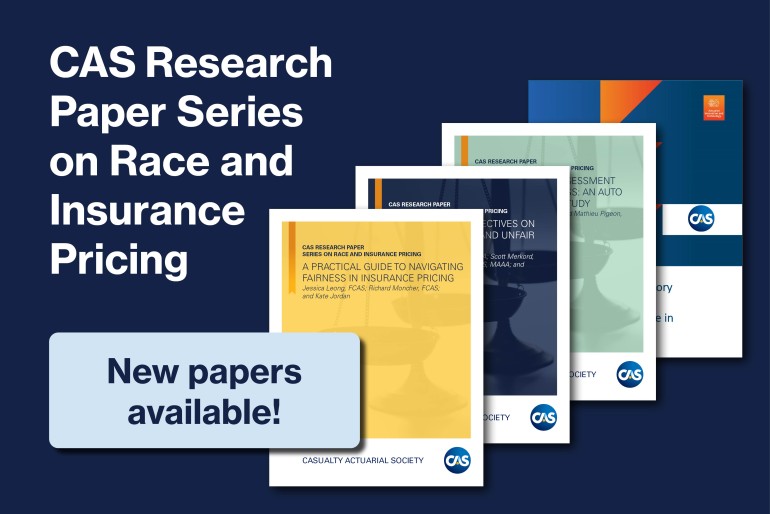Casualty Actuarial Society Releases New Reports in Race & Insurance Pricing Series

The Casualty Actuarial Society (CAS) is pleased to announce the release of four new reports that reveal ways actuaries can detect and address potential bias in property-casualty insurance pricing.
The newest reports — which are part of the CAS Research Paper Series on Race & Insurance Pricing —explore different aspects of unintentional potential bias in insurance pricing and progress from the series’ historical foundations to forward-looking solutions for quantifying and addressing potential bias. The papers empower actuaries with tools and considerations to address potential bias with topics ranging from regulatory considerations in the U.S. and worldwide to detecting and addressing potential bias in data and models.
“We continue to leverage the analytical skills and industry expertise of our actuaries to bring more understanding to this critical topic,” said Frank Chang, FCAS, CAS president. “These reports are designed to provide insight that will spark important discussions on potential biases and encourage actuaries to engage meaningfully with stakeholders on this pressing topic. The overall CAS Research Paper Series on Race & Insurance Pricing stands as a testament to our commitment to keep CAS members informed about emerging trends and provide employers and the industry with valuable expertise.”
The following four papers are available now:
“A Practical Guide to Navigating Fairness in Insurance Pricing” by Jessica Leong, FCAS; Richard Moncher, FCAS; and Kate Jordan
This paper provides actuaries with a comprehensive suite of model development and governance practices to promote fairness. It includes an overview of emerging regulations on bias and fairness in the insurance industry and other sectors such as housing, lending and hiring. The paper outlines approaches to minimize the risk of failing an analysis of unfair discrimination, covering aspects such as model governance, project planning, data preparation, model training, evaluation, selection, implementation, and monitoring.
“Regulatory Perspectives on Algorithmic Bias and Unfair Discrimination” by Lauren Cavanaugh, FCAS; Scott Merkord, FCAS; Taylor Davis, FCAS; and David Heppen, FCAS
This paper offers an overview of recent regulatory activities related to algorithmic bias and unfair discrimination, focusing on collaborative efforts by U.S. state regulators within the National Association of Insurance Commissioners. It is based on results from a survey of Insurance Departments, detailing regulators' perspectives on algorithmic bias, acceptable methodologies for identifying and addressing bias, use of protected class inference techniques and more. Practical considerations for actuaries to comply with regulatory requirements are also discussed.
“Balancing Risk Assessment and Social Fairness: An Auto Telematics Case Study” by Jean-Philippe Boucher, Ph.D. and Mathieu Pigeon, Ph.D.
This study examines how incorporating telematics data in auto insurance pricing algorithms can reduce reliance on protected or sensitive information such as age, gender, marital status, credit score and geography. Using a synthetic database built from confidential insurance data from an Ontario-based Canadian insurer, the study evaluates the potential for telematics to enhance fairness in insurance pricing.
“Comparison of Regulatory Framework for Non-Discriminatory AI Usage in Insurance,” By David Schraub, FSA; Jing Lang, FSA; Zhibin Zhang, FSA; and Mark A. Sayre, FSA. Produced with the Society of Actuaries.
This report provides a brief overview of recent and developing regulatory activity in China, Canada, Europe and the U.S. designed to avoid discriminatory use of artificial intelligence (AI) in the insurance industry.
Additional Papers to be Released Soon
Additional papers in the series, tentatively titled “Practical Application of Bias Measurement and Mitigation Techniques in Insurance Rating” and “Potential Unintended Impacts of Bias Mitigation on Other Protected Class Dimensions,” will be released this fall.
The CAS invites interested parties to collaborate on future research or educational opportunities on these critical topics to contact diversity@casact.org.
